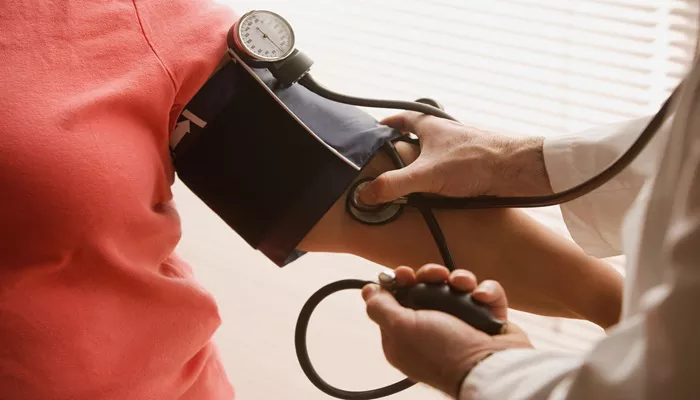High blood pressure, often referred to as hypertension, usually presents no symptoms but poses serious health risks.
Effective management often includes medication, but there are also natural methods to lower blood pressure through lifestyle changes.
Dr. Lola Ojutalayo, an interventional cardiologist at Mass General Brigham, emphasizes the importance of understanding the risks associated with high blood pressure and adopting lifestyle changes to mitigate these risks.
The Dangers of High Blood Pressure
“Blood pressure plays a crucial role in your overall cardiovascular health,” Dr. Ojutalayo explains. “When blood pressure is high, it increases the force against the walls of your arteries, which can lead to damage to vital organs.”
Hypertension significantly raises the risk of:
- Heart attack
- Heart failure
- Stroke
- Vision loss
- Kidney disease
Dr. Ojutalayo stresses the need for regular blood pressure monitoring, especially for those diagnosed with hypertension.
Can Lifestyle Changes Lower Blood Pressure?
“Certain lifestyle modifications can effectively improve your blood pressure,” Dr. Ojutalayo states. “For individuals with mildly elevated blood pressure, the first goal should be to return to a healthy range through lifestyle changes before considering medication.”
see also: Why Hypotension Occurs?
Blood pressure readings consist of two numbers:
Systolic (top number): Measures pressure in the arteries when the heart beats.
Diastolic (bottom number): Measures pressure in the arteries when the heart rests between beats.
Typical blood pressure categories include:
Normal: Systolic < 120 and diastolic < 80
Mildly elevated: Systolic 120-129 and diastolic < 80
Stage 1 hypertension: Systolic 130-139 and diastolic 80-89
Stage 2 hypertension: Systolic ≥ 140 and diastolic ≥ 90
Regardless of the category, lifestyle changes are crucial and beneficial even for those already on medication.
Natural Methods to Lower Blood Pressure
Dr. Ojutalayo notes that lifestyle changes can reduce systolic blood pressure by five to ten points. Such reductions can potentially eliminate the need for medication or lower dosages for those with hypertension.
Here are Dr. Ojutalayo’s recommendations for natural blood pressure reduction:
1. Achieve a Healthy Weight
If you are overweight, losing weight can significantly impact your blood pressure. Excess weight can lead to:
Changes in fluid handling in the body, increasing blood pressure.
Additional pressure on organs and blood vessels.
Increased blood volume due to more blood vessels.
A higher risk of sleep apnea, which can contribute to hypertension.
“Maintaining a healthy weight not only reduces your risk of sleep apnea and high blood pressure but also enhances overall cardiovascular health,” Dr. Ojutalayo adds.
2. Reduce Sodium Intake
Sodium directly affects blood pressure. “Higher sodium levels in the bloodstream lead to fluid retention, increasing pressure in blood vessels,” Dr. Ojutalayo explains.
She recommends limiting sodium intake to no more than 1,500 milligrams per day for those with high blood pressure.
Checking food labels can help track sodium consumption.
3. Follow a Heart-Healthy Diet
The Dietary Approaches to Stop Hypertension (DASH) diet promotes cardiovascular health and allows for a variety of foods.
The DASH diet emphasizes:
- Fruits and vegetables
- Low-fat or fat-free dairy products
- Fish and poultry
- Whole grains
- Beans and nuts
- It advises limiting:
- Fatty meats
- Full-fat dairy products
- Red meat
- Salt
- Sugary drinks and foods
- Tropical oils like coconut and palm oil
4. Engage in Regular Exercise
“Exercise is beneficial for blood pressure and helps maintain a healthy weight,” Dr. Ojutalayo states. She recommends:
At least 150 minutes of moderate-intensity activity weekly, or
At least 75 minutes of high-intensity activity weekly.
Walking can be a great option for people of all fitness levels.
5. Quit Smoking and Limit Alcohol
Both smoking and excessive alcohol consumption raise blood pressure. Dr. Ojutalayo advises those looking to quit smoking to seek support from healthcare providers.
For alcohol, she recommends limiting intake to one drink per day for women and two for men.
6. Manage Stress
“Reducing stress is crucial for managing blood pressure,” Dr. Ojutalayo notes. Stress can raise blood pressure both immediately and over time if it becomes chronic.
Exercise, meditation, and relaxation techniques can help manage stress levels.
Conclution
Can Lifestyle Changes Replace Blood Pressure Medication?
“While it may be possible to reduce or eliminate blood pressure medication through lifestyle changes, this depends on the individual’s condition and should always be discussed with a healthcare provider,” Dr. Ojutalayo advises.
Regardless, adopting healthy lifestyle changes can enhance blood pressure control, improve cardiovascular health, and lower the risk of chronic diseases.

